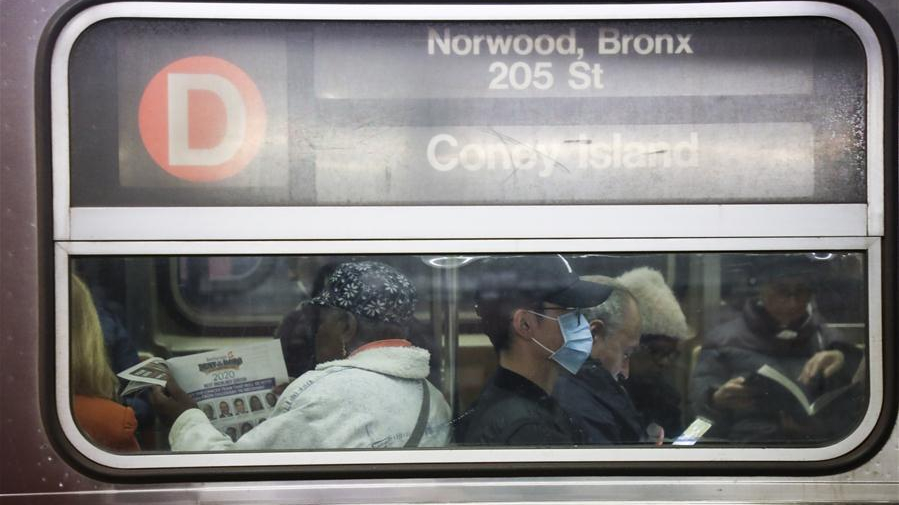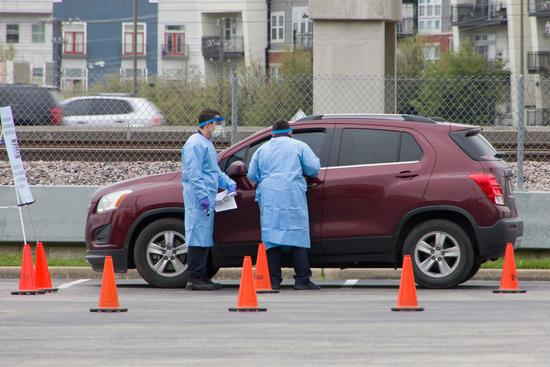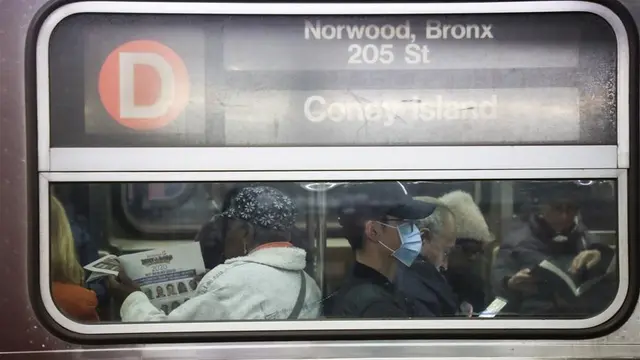
A passenger with face mask is seen on a metro train in Manhattan, New York, the United States, March 4, 2020. /Xinhua
Police departments across the U.S.have been releasing convicted criminals and refusing to arrest those suspected of certain non-violent crimes in order to prevent COVID-19 from spreading out of control in densely packed prisons and to ease the burden on law enforcement officers so that they can better respond to this pandemic if need be.
These actions have been extremely controversial and raise important questions about the future of the criminal justice system.
On the one hand, it's understandable that the authorities proactively take the necessary precautions to prevent the prison system from becoming America's new epicenter of this outbreak, but on the other, it sends the worrying message to the majority of law-abiding citizens that the law itself no longer matters as much as before.
This raises fear that the police themselves are either becoming delinquent in their duties and/or are afraid of contracting this virus through their regular interactions with the public.
The scenario of law enforcement officers falling victim to COVID-19 en masse would surely be dystopian because it would almost certainly lead to a breakdown of law and order in some locales that could in turn present a so-called "window of opportunity" for criminals to go wild, unless of course the National Guard moves in to replace them, but that would feed into populist speculation that martial law is imminent. Whatever their real motivations may be, it's clear that these actions will have lasting consequences after the crisis ends.
It's difficult to imagine the criminal justice system returning to its pre-COVID-19 days after the commencement of this trend.
Activists in support of criminal justice reform will predictably argue that the police themselves tacitly acknowledged that the prisons are dangerously crowded and unsanitary, some crimes aren't worth arresting people over, and there's nothing stopping the early release of any convicted criminal in principle.
Their opponents, however, will predictably have some arguments of their own.
They're likely to agree with the criminal justice reform activists in respect to the dangerously crowded and unsanitary prison system, but point out that fixing this problem would mean that there's no longer any reason to stop arresting people for committing crimes as opposed to simply handing them a court summons for a future date as is now becoming the norm in the communities that adopted this new policy, nor any reason to release many of them early.

Staff work at a drive-through COVID-19 testing site in Dallas, Texas, the United States, March 21, 2020. /Xinhua
Building more prisons, however, could have the unintended effect of increasing America's globally notorious incarceration rates, especially if those facilities are privately owned and thus have a profit incentive to keep people imprisoned.
Further "upstream" in this de-facto business, courts might be more likely to sentence people to prison for non-violent crimes such as drug possession, while at the system's "point of contact" with the populace, the police might prioritize stopping such crimes at the expense of more serious ones.
At this point, there's a very high likelihood that the topic of criminal justice reform will figure on the agenda of priorities after the COVID-19 crisis inevitably ends.
Activists might file lawsuits against the courts to stop them from arresting suspects before their court appearances who were only given summons during that time, the same as they're likely to agitate for decriminalizing some of those same officially criminal actions such as drug possession. Politicians might latch onto these causes and therefore elevate them to the state and federal levels.
In the meantime, concerned citizens might double down on their second amendment rights by continuing to buy guns and ammunition at a record pace. From their perspective, the prevailing uncertainty surrounding the criminal justice system means that they have to do all that they can to defend themselves in the worst-case scenario that they can't rely on the police.
Altogether, the overarching trend of this topic is that Americans are becoming more suspicious of both the state and each other, which isn't good news for the coming future.
(CGTN)
 简体中文
简体中文





